Nine-year-old Thathagat Kumar and his father Ajay Kumar had the most surreal time of their lives last Sunday when javelin thrower Neeraj Chopra, the historic World Athletics Championships gold medal around his neck, made his way to a group of Indian fans in the stands at the National Athletics Centre in Budapest and clicked a selfie for them.
For the Indians in the stadium, watching track and field athletes from their country on the final night of the prestigious competition was the icing on the cake. For eight days, the few hundred Indians had contented themselves with being world citizens, cheering Americans, Jamaicans, Ethiopians, Kenyans and Canadians, among others.
Then, as Budapest transformed from an unbearably hot and humid host in the first half of the championships to a cooler clime when the curtains came down, India’s fortunes changed. It was seen in better light by not just the 36,000 fans of different nationalities at the stadium, but also many beyond.
In 90 minutes punctuated by the heartening efforts of fellow javelin throwers Kishore Jena and D.P. Manu, Parul Chaudhary’s national record in the 3,000m steeplechase final, and the men’s 4x400m relay team’s heroic run on the second successive night, Chopra’s gold medal, a first for India in half a century of World Championships history, became the highlight of the week.
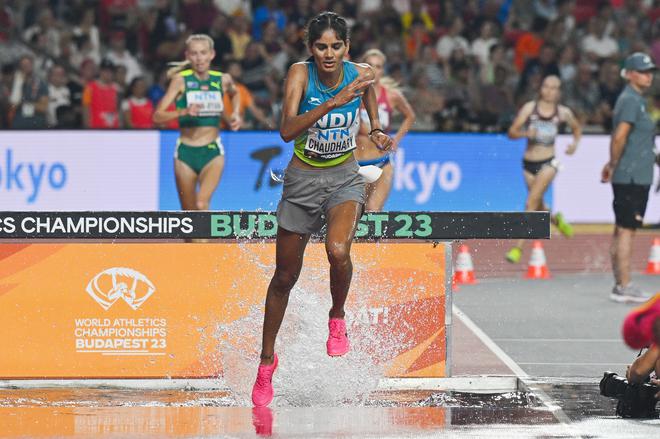
“It was surreal,” says Ajay, a Mumbai-based edutech entrepreneur. “I wanted to give Thathagat, who follows a range of sports, the experience of watching multiple disciplines in one event. He got to watch a legend like Jamaican sprinter Shelly-Ann Fraser-Pryce from close quarters. She has defied age, come back to the track after motherhood, and been a great ambassador.”
Yet, the truth is that apart from a small community of hardcore fans, Indian athletics does not attract much attention at home. It will be a while before a larger group of fans travels to major athletics competitions around the world to cheer on their country’s talents. The sport needs heroes and many of India’s aces are but works in progress.
With the young in the audience having been weaned on various screens that bring home legends from a variety of sports, India’s athletes have a massive challenge on their hands. Until they are seen more often — and seen winning — cult status as obtained by cricketers, for instance, will be hard to achieve.
Aura of Neeraj Chopra
In recent years, however, India’s javelin throwers and horizontal jumpers have earned the respect of the track and field community around the world. There was some evidence of that as competitors from other nations and fans clicked selfies with athletes such as national record-holding long jumper M. Sreeshankar even before Chopra landed in Budapest.
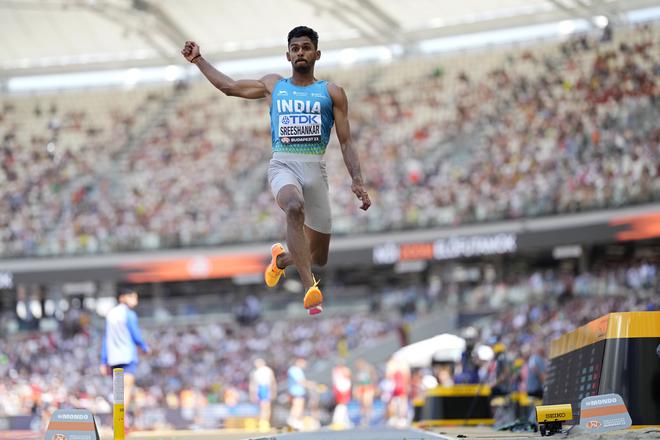
But after the fireworks expected of Avinash Sable (steeplechase), Jeswin Aldrin (long jump), Praveen Chithravel (triple jump) and Sreeshankar fizzled out, the contingent sank into gloom. The passionate Vaibhav Manocha, a strategy manager from Gurugram, who spent a good part of 10 days watching the World Championships with his wife, was among those who felt let down by Sable and the others.
“The sport would have got such a boost had these athletes been able to showcase their talent here. It was hard to understand the dip in their performances after they promised so much earlier this year,” he says, finding an escape in the remarkable show of athletic prowess by Switzerland pole vaulter Armand ‘Mondo’ Duplantis, American shot putter Ryan Crouser and dozens of others.
It was not until Olympic champion and last year’s world silver medallist Chopra arrived from his training base in Switzerland that the Indian squad found reason for cheer. The perceptible change in Indian athletes’ attitude — from mere participants to becoming serious competitors and striving to win — can be largely attributed to Chopra backing his Olympic gold in 2021 with a World Championships silver in 2022. It is not just javelin throwers such as Manu and Jena who have drawn inspiration from him but also Sreeshankar, who has spoken about finding motivation from Chopra.
Besides improved displays over the weekend at Budapest, a pointer towards the evolution of Indian athletics is the readiness with which the athletes accept that they came up short. There was a time when Indians would blame the weather or lack of exposure or just about anything else, but the contemporary lot acknowledges and owns up to failure, promising to work on their shortcomings.
Olympic dreams
Does Budapest then signal an optimistic outlook for Indian athletics at Paris 2024? Of course, it does. The manner in which its athletes turned the mood of followers from despair to hope with their creditable performance is praiseworthy, and sparks the belief that Chopra will not be the only one to inspire confidence that he can win in Paris.
Yet, it is unfair to compare Indian athletics with other nations. Obviously, India did not figure in the top 15 on either the medals chart or the placings table that takes into account top-eight finishes. The one gold India won pitchforked it to the 18th spot on the medal chart while the four top-eight finishes lifted it to 21st on the placings table.
“We could have finished higher had Sable and the horizontal jumpers performed to potential and expectations,” says Adille Sumariwalla, president of the Athletics Federation of India. With the support of the Ministry of Youth Affairs and Sports, there is no dearth of funds for the present generation of athletes when it comes to training, including extended stays overseas or in national camps at home, and competitive exposure, he says. “If we can get our athletes to train with the right coaches, they will get better results. Have not Neeraj, Parul and the relay teams shown that training with overseas coaches enables them to realise their potential?”
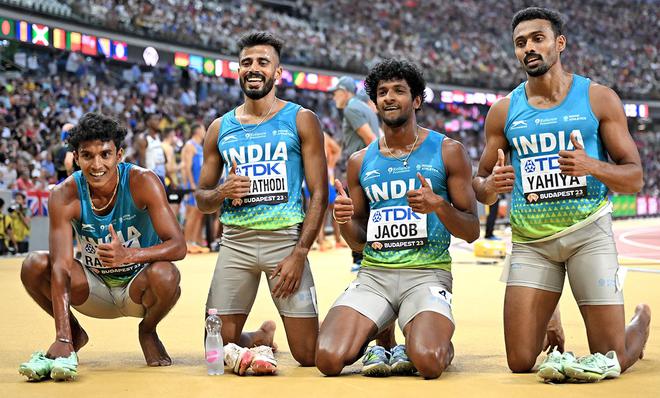
Sumariwalla is referring to German biomechanics expert Klaus Bartonietz, who has worked with Chopra since 2019, American Scott Simmons who trains the middle- and long-distance runners, and Jamaican Jason Dawson who oversees the relay runners’ preparation. “We have been trying to get our athletes to work with overseas coaches in jumps and walks where we can match wits with the best,” he says.
Athletes to ambassadors
Even as such progress must be appreciated, it is inescapable that Indian athletics has to deal with a few issues, not least being the scourge of doping. The number of leading names on the list of either those provisionally suspended or those banned for anti-doping rule violations is a matter of grave concern.
These are pangs that can be expected as India continues its growth as a track and field nation. With the athletics federation striving to enhance the standard of coaching at the grassroots level and campaigning against early specialisation, over-training, age-fraud and doping, the general environment has shown a gradual improvement. Yet, it is a challenge for athletes from mostly non-urban backgrounds to hold the attention of audiences and sponsors that are largely urban.
It would seem wrong then to compare them against those flamboyant and charismatic overseas athletes who double up as eye-catching and entertaining ambassadors of their sport. At the moment, it is hard to think of Indian athletes who wear their heart on their sleeve a la Fraser-Pryce or speak with the bombastic confidence of a Noah Lyles. Besides it being a cultural thing — nearly every Indian article on Chopra starts with a mention of his humble nature — the understated performances are a reason why Indians may not add to the glamour quotient.
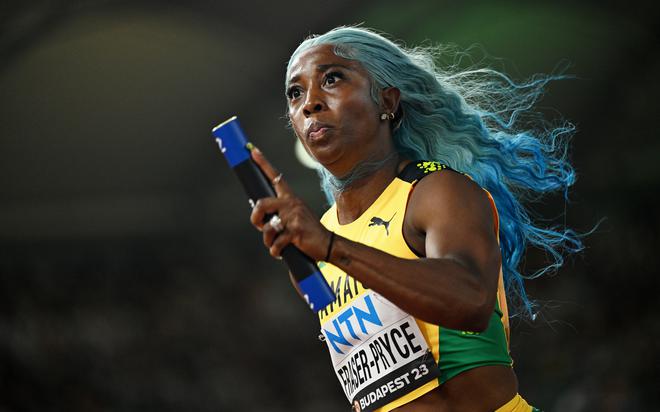
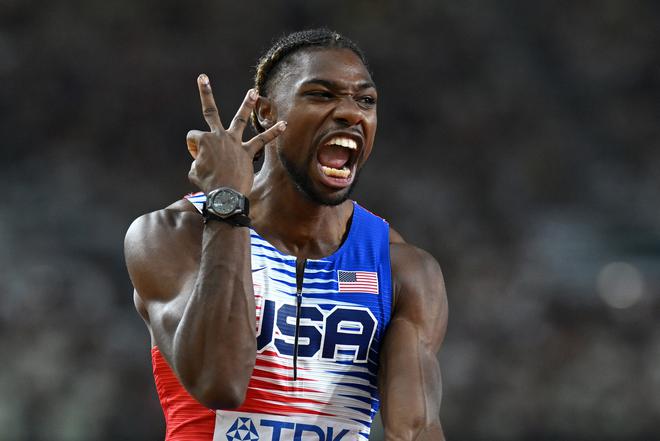
All about winning
For Paris 2024 to be the Olympic Games where India aspires to win multiple medals in athletics, more ground needs to be covered over the next few months. Besides careful planning, including adapting the training regime in the best interest of the country, the athletes will have to be assisted in building mental toughness to be ready to face any situation. For, getting to this level fearlessly is one thing and performing fearlessly is another.
As the Indian squad returns from Budapest and gets ready for the Asian Games later this month, quite a few may wonder if the athletes let themselves and India down. To understand this from a sportsperson’s perspective, let us go back to Chopra. “One bad meet does not make them bad athletes. I am sure they will reflect on what went wrong and come back stronger the next time,” he says.
It will be interesting to see how this takes shape and the outcome of any deep dive, especially at next year’s Olympics. That will perhaps lead to having more Thathagats vociferously egging on Indian athletes in Paris. And to a surge in track and field sport in the country.
The freelance writer began his sports journalism career in 1983 on The Hindu’s sports desk.







